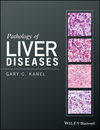Miscellaneous Hepatic Disorders
Abstract
Amyloidosis is a systemic disorder associated with the deposition of an extracellular homogeneously eosinophilic protein within numerous organ systems. Patients clinically present with signs and symptoms related to the organ system involved by amyloid deposits and include cardiac, renal, gastrointestinal, endocrine, and neural manifestations. Globular amyloidosis is a histologic variant of systemic amyloidosis that is often associated with the chronic inflammatory disorders, with amyloid involving the kidneys, adrenal glands, and spleen but usually not associated with involvement of other organ systems. Alterations in liver function and various histologic hepatic changes can occur in gastrointestinal disorders, in large part due to the drainage of the various toxins and other substances via the mesenteric, splenic and portal venous network into the liver. The various liver disorders associated with pregnancy can be mild and self-limited or severe with a fatal outcome.



